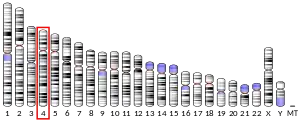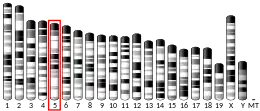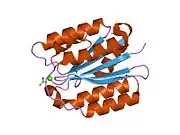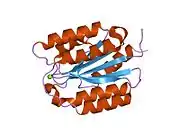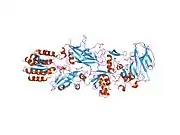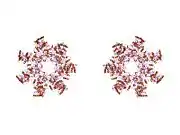ANTXR2
Anthrax toxin receptor 2 (also known as Capillary Morphogenesis Gene 2 or CMG2) is a protein that in humans is encoded by the ANTXR2 gene.[5][6][7]
| ANTXR2 | |||||||||||||||||||||||||||||||||||||||||||||||||||
|---|---|---|---|---|---|---|---|---|---|---|---|---|---|---|---|---|---|---|---|---|---|---|---|---|---|---|---|---|---|---|---|---|---|---|---|---|---|---|---|---|---|---|---|---|---|---|---|---|---|---|---|
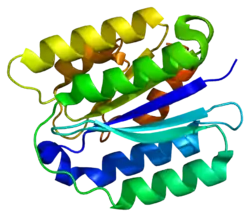 | |||||||||||||||||||||||||||||||||||||||||||||||||||
| |||||||||||||||||||||||||||||||||||||||||||||||||||
| Identifiers | |||||||||||||||||||||||||||||||||||||||||||||||||||
| Aliases | ANTXR2, CMG-2, CMG2, HFS, ISH, JHF, anthrax toxin receptor 2, ANTXR cell adhesion molecule 2 | ||||||||||||||||||||||||||||||||||||||||||||||||||
| External IDs | OMIM: 608041 MGI: 1919164 HomoloGene: 43236 GeneCards: ANTXR2 | ||||||||||||||||||||||||||||||||||||||||||||||||||
| |||||||||||||||||||||||||||||||||||||||||||||||||||
| |||||||||||||||||||||||||||||||||||||||||||||||||||
| |||||||||||||||||||||||||||||||||||||||||||||||||||
| |||||||||||||||||||||||||||||||||||||||||||||||||||
| |||||||||||||||||||||||||||||||||||||||||||||||||||
| Wikidata | |||||||||||||||||||||||||||||||||||||||||||||||||||
| |||||||||||||||||||||||||||||||||||||||||||||||||||
See also
References
- GRCh38: Ensembl release 89: ENSG00000163297 - Ensembl, May 2017
- GRCm38: Ensembl release 89: ENSMUSG00000029338 - Ensembl, May 2017
- "Human PubMed Reference:". National Center for Biotechnology Information, U.S. National Library of Medicine.
- "Mouse PubMed Reference:". National Center for Biotechnology Information, U.S. National Library of Medicine.
- Bell SE, Mavila A, Salazar R, Bayless KJ, Kanagala S, Maxwell SA, Davis GE (Oct 2001). "Differential gene expression during capillary morphogenesis in 3D collagen matrices: regulated expression of genes involved in basement membrane matrix assembly, cell cycle progression, cellular differentiation and G-protein signaling". J Cell Sci. 114 (Pt 15): 2755–73. doi:10.1242/jcs.114.15.2755. PMID 11683410.
- Scobie HM, Rainey GJ, Bradley KA, Young JA (Apr 2003). "Human capillary morphogenesis protein 2 functions as an anthrax toxin receptor". Proc Natl Acad Sci U S A. 100 (9): 5170–4. Bibcode:2003PNAS..100.5170S. doi:10.1073/pnas.0431098100. PMC 154317. PMID 12700348.
- "Entrez Gene: ANTXR2 anthrax toxin receptor 2".
External links
- Human ANTXR2 genome location and ANTXR2 gene details page in the UCSC Genome Browser.
Further reading
- Sanger Centre, The; Washington University Genome Sequencing Cente, The (1999). "Toward a complete human genome sequence". Genome Res. 8 (11): 1097–108. doi:10.1101/gr.8.11.1097. PMID 9847074.
- Strausberg RL, Feingold EA, Grouse LH, et al. (2003). "Generation and initial analysis of more than 15,000 full-length human and mouse cDNA sequences". Proc. Natl. Acad. Sci. U.S.A. 99 (26): 16899–903. Bibcode:2002PNAS...9916899M. doi:10.1073/pnas.242603899. PMC 139241. PMID 12477932.
- Abrami L, Liu S, Cosson P, et al. (2003). "Anthrax toxin triggers endocytosis of its receptor via a lipid raft-mediated clathrin-dependent process". J. Cell Biol. 160 (3): 321–8. doi:10.1083/jcb.200211018. PMC 2172673. PMID 12551953.
- Dowling O, Difeo A, Ramirez MC, et al. (2003). "Mutations in capillary morphogenesis gene-2 result in the allelic disorders juvenile hyaline fibromatosis and infantile systemic hyalinosis". Am. J. Hum. Genet. 73 (4): 957–66. doi:10.1086/378781. PMC 1180616. PMID 12973667.
- Hanks S, Adams S, Douglas J, et al. (2003). "Mutations in the gene encoding capillary morphogenesis protein 2 cause juvenile hyaline fibromatosis and infantile systemic hyalinosis". Am. J. Hum. Genet. 73 (4): 791–800. doi:10.1086/378418. PMC 1180602. PMID 14508707.
- Ota T, Suzuki Y, Nishikawa T, et al. (2004). "Complete sequencing and characterization of 21,243 full-length human cDNAs". Nat. Genet. 36 (1): 40–5. doi:10.1038/ng1285. PMID 14702039.
- Wigelsworth DJ, Krantz BA, Christensen KA, et al. (2004). "Binding stoichiometry and kinetics of the interaction of a human anthrax toxin receptor, CMG2, with protective antigen". J. Biol. Chem. 279 (22): 23349–56. doi:10.1074/jbc.M401292200. PMID 15044490.
- Lacy DB, Wigelsworth DJ, Scobie HM, et al. (2004). "Crystal structure of the von Willebrand factor A domain of human capillary morphogenesis protein 2: an anthrax toxin receptor". Proc. Natl. Acad. Sci. U.S.A. 101 (17): 6367–72. Bibcode:2004PNAS..101.6367L. doi:10.1073/pnas.0401506101. PMC 404051. PMID 15079089.
- Colland F, Jacq X, Trouplin V, et al. (2004). "Functional proteomics mapping of a human signaling pathway". Genome Res. 14 (7): 1324–32. doi:10.1101/gr.2334104. PMC 442148. PMID 15231748.
- Santelli E, Bankston LA, Leppla SH, Liddington RC (2004). "Crystal structure of a complex between anthrax toxin and its host cell receptor". Nature. 430 (7002): 905–8. Bibcode:2004Natur.430..905S. doi:10.1038/nature02763. PMID 15243628. S2CID 4398499.
- Lacy DB, Wigelsworth DJ, Melnyk RA, et al. (2004). "Structure of heptameric protective antigen bound to an anthrax toxin receptor: a role for receptor in pH-dependent pore formation". Proc. Natl. Acad. Sci. U.S.A. 101 (36): 13147–51. Bibcode:2004PNAS..10113147L. doi:10.1073/pnas.0405405101. PMC 516539. PMID 15326297.
- Abrami L, Lindsay M, Parton RG, et al. (2004). "Membrane insertion of anthrax protective antigen and cytoplasmic delivery of lethal factor occur at different stages of the endocytic pathway". J. Cell Biol. 166 (5): 645–51. doi:10.1083/jcb.200312072. PMC 2172425. PMID 15337774.
- Gerhard DS, Wagner L, Feingold EA, et al. (2004). "The status, quality, and expansion of the NIH full-length cDNA project: the Mammalian Gene Collection (MGC)". Genome Res. 14 (10B): 2121–7. doi:10.1101/gr.2596504. PMC 528928. PMID 15489334.
- Lee JY, Tsai YM, Chao SC, Tu YF (2005). "Capillary morphogenesis gene-2 mutation in infantile systemic hyalinosis: ultrastructural study and mutation analysis in a Taiwanese infant". Clin. Exp. Dermatol. 30 (2): 176–9. doi:10.1111/j.1365-2230.2004.01698.x. PMID 15725249. S2CID 45945185.
- Abrami L, Leppla SH, van der Goot FG (2006). "Receptor palmitoylation and ubiquitination regulate anthrax toxin endocytosis". J. Cell Biol. 172 (2): 309–20. doi:10.1083/jcb.200507067. PMC 2063559. PMID 16401723.
- Gao M, Schulten K (2007). "Onset of anthrax toxin pore formation". Biophys. J. 90 (9): 3267–79. doi:10.1529/biophysj.105.079376. PMC 1432108. PMID 16473908.
- Wei W, Lu Q, Chaudry GJ, et al. (2006). "The LDL receptor-related protein LRP6 mediates internalization and lethality of anthrax toxin". Cell. 124 (6): 1141–54. doi:10.1016/j.cell.2005.12.045. PMID 16564009.
This article is issued from Wikipedia. The text is licensed under Creative Commons - Attribution - Sharealike. Additional terms may apply for the media files.
